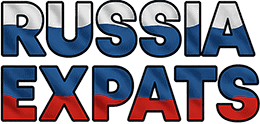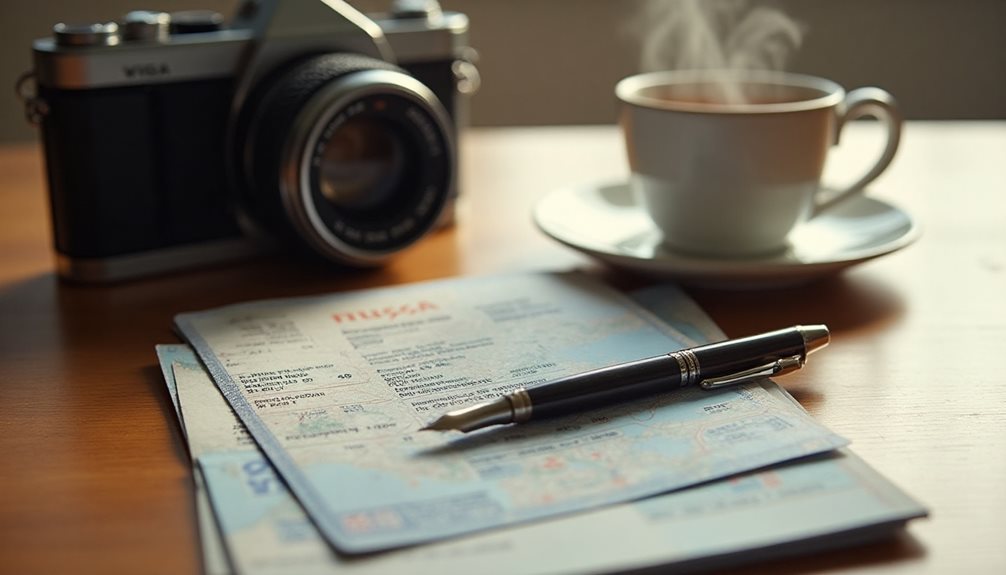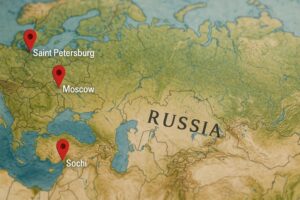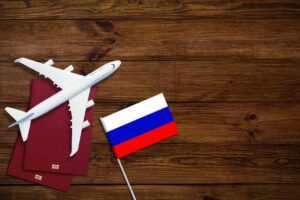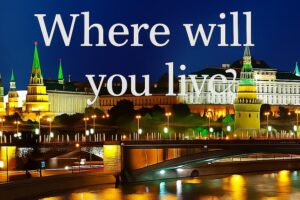Relocating to Russia requires careful preparation of essential documents to avoid complications upon arrival. Passports, visas, work permits, and residency registrations form the backbone of a compliant move. Understanding the specific immigration requirements and maintaining organized paperwork can greatly ease the shift. Without the proper documentation, access to services and legal employment may be jeopardized, making it vital to address these matters well in advance. This foundational step sets the tone for a smoother integration process.
The Importance of Having All Necessary Documents Before Moving to Russia
Moving to a new country is an exciting adventure filled with opportunities for personal growth, new experiences, and fresh beginnings. When that destination is Russia—a country rich in history, culture, and vast landscapes—being thoroughly prepared makes all the difference. One of the most important steps to ensure a smooth transition is having all the necessary documents ready well before your move. Proper document preparation not only eases your entry but also helps you settle confidently and quickly into your new life.
Having your paperwork in order, in advance, is much more than a bureaucratic formality—it’s the foundation of a hassle-free experience. Complete and accurate documentation minimizes unexpected expenses and unforeseen delays that can arise when crossing borders or navigating Russian administrative systems. It also establishes your legal status clearly, which is vital for everything from securing housing to accessing local services.
Russia offers a welcoming environment with diverse opportunities for work, study, and cultural enrichment. To fully embrace these, you need the right permits, visas, and identification documents in place. These papers act as your keys to unlocking new possibilities without interruptions or setbacks.
Organizing Your Documents: Checklist and Timeline
A smart starting point is creating a comprehensive checklist of all essential documents. This typically includes:
- Valid passports for all family members
- Russian visas appropriate to your purpose of stay (work, study, family reunification, etc.)
- Work or residence permits
- Original, notarized and apostilled birth certificates and marriage certificates (as well as divorce papers and name-change documents).
- Medical records and insurance documents
- Academic transcripts or professional certifications
Once you have this list, establish a clear timeline for collecting and verifying these documents. Starting early prevents last-minute rushes and reduces stress, ensuring every form is current, signed where needed, and compliant with Russian regulations.
Even small oversights can cause delays. Common mistakes include using expired passports, missing required signatures, or submitting untranslated documents without certification. Double-checking each item before submission saves valuable time and helps you avoid frustrating back-and-forth with authorities.
Smart Storage Solutions for Peace of Mind
Keeping your documents safe during travel and after arrival is just as important as preparing them. Use waterproof folders or document organizers to protect physical papers from damage. It’s also recommended to have multiples of each document. Additionally, create digital backups stored securely online or on encrypted drives. This way, you can quickly access copies if originals are lost or misplaced.
Understanding Russian Immigration Requirements
Successfully relocating to Russia requires more than just proper documentation; it demands a clear understanding of the country’s specific immigration rules and procedures. Russia’s immigration system is structured to manage legal entry, residency, and work rights, and being well-informed helps avoid delays and legal issues. Before moving to Russia, securing the correct visa type and work permit is a critical step. These documents authorize your legal stay and employment in the country, and their timely acquisition ensures compliance with Russian immigration laws.
Visa Types for Russia
Russia offers a range of visa categories tailored to different purposes, including:
- Tourist Visa: Short-term stay for tourism purposes, usually up to 30 days.
- Business Visa: For business trips, meetings, negotiations, or conferences. It can be single, double, or multiple entry.
- Work Visa: Required for foreigners intending to work in Russia. This visa is linked to a work permit issued by the employer.
- Student Visa: For those enrolled in Russian educational institutions.
- Private Visa: For visiting relatives or friends who are Russian citizens or permanent residents.
- Humanitarian Visa: For cultural exchanges, scientific research, or sports events.
Each visa type has specific documentation requirements, such as invitation letters, proof of finances, health insurance, and purpose of visit.
Registration: Establishing Your Legal Residency
Upon arrival in Russia, foreigners are required to register their place of residence within the timeframe established by Russian law, usually within seven working days. This registration confirms your legal address and is essential for accessing a wide range of services. Typically, the registration process is handled through your landlord or employer. It is important to keep your registration current and update it as needed—not only when your visa conditions require it but also if you leave Russia and return (for example, on a tourist visa) or if you move to a different location within the country. Staying compliant with these requirements ensures your residency status remains valid and prevents potential legal issues.
- Temporary Residence Permit (TRP): Valid for 3 years, allowing stay and work without additional permits. Requires passing a language test, medical exam, and proof of income.
- Permanent Residence Permit (PRP): Allows indefinite residence and broader rights. Usually granted after one year of temporary residence.
- Russian Citizenship: Can be applied for after several years of permanent residence (usually five years), with additional requirements including language proficiency and no serious criminal record.
Application Process and Legal Obligations
The immigration process involves several key steps:
- Obtaining an Invitation: Required for most visa types, issued by a Russian organization or individual.
- Visa Application: Submission at a Russian consulate or embassy abroad with all necessary documents.
- Registration Upon Arrival: Foreigners must register their place of residence within 7 working days after entering Russia. This is mandatory and often done by landlords or employers.
- Work Permits and Invitations: For work visas, employers must obtain permission to hire foreign nationals.
- Medical Checks: Some permits require medical examinations to confirm health status.
Failure to comply with any step can result in fines, deportation, or bans on re-entry.
Resources for Expats
Numerous official and unofficial resources are available to assist newcomers:
- Federal Migration Service of Russia (FMS): Official source of immigration laws and procedures.
- Russian Ministry of Foreign Affairs: Visa application guidelines.
- Expat Forums and Communities: Offer practical advice on navigating day-to-day life, legal matters, and cultural adaptation.
- Legal Consultants Specializing in Immigration: Provide personalized assistance especially for business and complex residency cases.
Understanding Russia’s immigration requirements is crucial for anyone planning to live or work in the country. From choosing the correct visa type to following the registration rules, every detail matters. Proper preparation ensures a smooth transition and helps newcomers enjoy the freedoms and opportunities that Russia offers without unexpected legal obstacles.
Avoiding Legal Pitfalls and Penalties
Non-compliance with immigration requirements can result in fines, deportation, or delays that disrupt your plans.
- Common Issues: Missing deadlines for registration or visa renewal, incomplete paperwork, or misunderstanding local regulations.
- Solutions: Stay informed about current rules, seek professional legal advice when necessary, and follow a checklist to cover all requirements.
- Benefits: Proper compliance protects your rights and supports a stable, uninterrupted stay.
Accessing Essential Services Through Proper Documentation
Holding the right documents unlocks access to healthcare, banking, housing, education, employment, and more.
- Healthcare: Legal registration enables access to medical services without barriers.
- Banking: Verified identification is needed to open bank accounts and use financial services.
- Housing: Proof of legal residence facilitates rental agreements and protects tenant rights.
- Employment & Education: Work permits and verified qualifications allow you to participate fully in the labor market and academic institutions.
![]()
Overcoming Challenges: Language and Cultural Integration
Adapting to life in a new country often presents significant challenges, especially when it comes to language barriers and cultural differences. In Russia, documentation and legal status play a crucial role in facilitating smoother integration into society, as they grant access to various resources designed to support language learning and cultural adaptation.
Language Courses:
Having the proper legal status often allows foreigners to enroll in government-sponsored or private language programs. These courses are vital for developing Russian language skills, which are essential for daily communication, accessing services, and building relationships. While many Russians tend to be cordial and patient with foreigners who do not speak Russian, relying solely on others’ goodwill can limit one’s opportunities. Learning the language is fundamental to achieving a successful and fulfilling life in Russia, opening doors to deeper social connections, better employment, and a richer cultural experience.
Community Programs:
Registration and legal documentation also enable participation in community programs that connect newcomers with local events and expatriate networks. These programs provide valuable opportunities to engage with Russian society, understand cultural norms, and build supportive relationships. Active involvement in community life significantly eases the feeling of isolation that many newcomers experience.
Workplace Integration:
In the professional sphere, certificates of language proficiency and demonstrated cultural understanding greatly improve job prospects. Employers in Russia often prioritize candidates who can communicate effectively in Russian and show respect for local customs. Achieving certification not only boosts confidence but also signals readiness to integrate smoothly into the workplace environment.
In summary, while Russians generally exhibit patience and friendliness toward foreigners struggling with the language, investing time and effort in learning Russian is indispensable. It is the key to unlocking meaningful social interactions, professional opportunities, and a rewarding life in Russia. Proper documentation acts as the gateway to resources that support this journey, making it easier to overcome linguistic and cultural challenges.
Practical Tips for a Smooth Relocation: Be Prepared, Organized, and Well-Informed
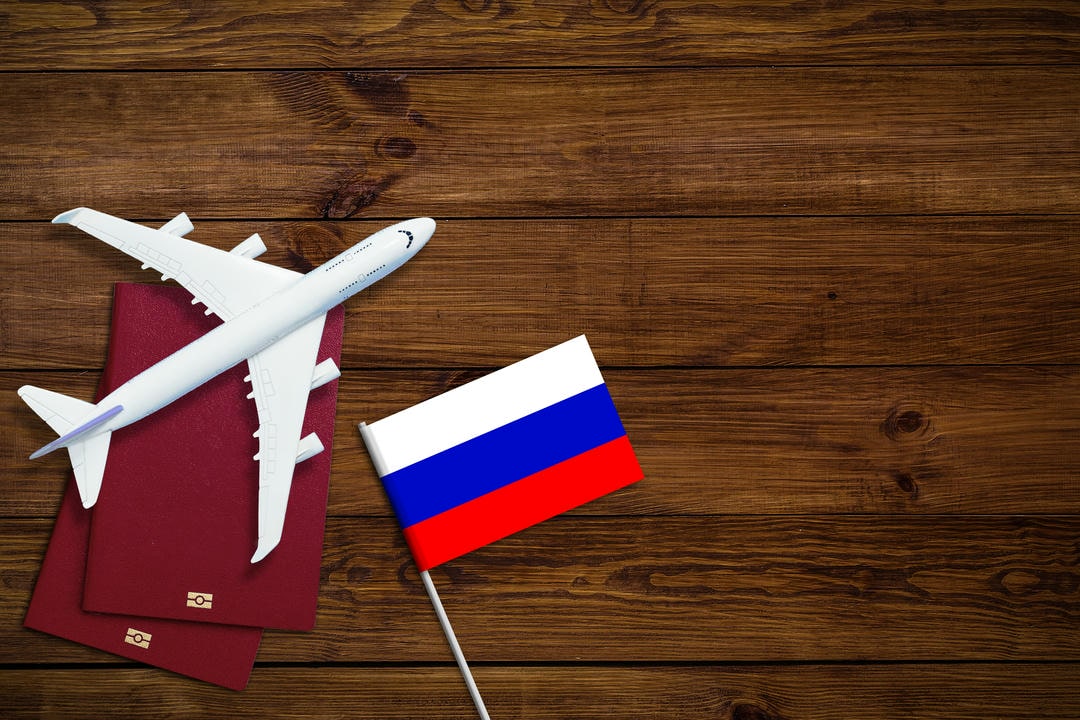
Relocating, especially to a country like Russia with complex immigration procedures, requires thorough preparation and careful organization. To ensure a smooth transition, it’s essential to invest time in research, plan meticulously, and stay up-to-date with legal requirements. Here are some expanded and detailed tips to help you manage your move effectively:
1. Create a Comprehensive Moving Checklist
Start by drafting a detailed checklist that covers every aspect of your relocation. This should include:
- Visa applications: Note the types of visas you qualify for and their specific requirements.
- Work permit processing: Understand the application process, timelines, and necessary documents.
- Registration deadlines: Familiarize yourself with Russian registration laws (e.g., registration within 7 days of arrival).
- Document copies: Prepare multiple physical and digital copies of passports, visas, work permits, rental agreements, and other important papers.
- Emergency contacts: List local emergency numbers, embassy contacts, medical facilities, and trusted acquaintances.
Having a clear roadmap reduces stress and prevents last-minute surprises.
2. Conduct Thorough Research and Seek Updated Legal Advice
Russian immigration laws and policies can change frequently. To avoid complications:
- Monitor official government websites for the latest updates on visa rules and registration procedures.
- Consult immigration experts or legal professionals who specialize in Russian law to clarify doubts and get personalized guidance.
- Join expat forums and communities to learn from others’ experiences and practical tips.
Being well-informed helps you avoid mistakes that could delay your move or lead to legal issues.
3. Organize Digital Backups of Important Documents
Keeping secure digital copies of your documentation is critical:
- Use a reliable cloud storage service with strong encryption to save scanned copies of your passport, visa, work permit, birth certificates, contracts, and insurance papers.
- Ensure these backups are accessible from anywhere in case physical copies are lost or stolen during the move.
- Consider using password-protected folders or apps specifically designed for secure document storage.
This preparation ensures you can quickly retrieve critical information when needed.
4. Stay Compliant by Following Every Step Carefully
Compliance with Russian immigration and registration rules is crucial to avoid fines, delays, or deportation. To stay compliant:
- Follow all application instructions precisely, double-check forms before submission, and keep track of deadlines.
- Keep proof of submission and correspondence with authorities for your records.
- Complete mandatory registrations on time after arrival (for example, registering your address within the required period).
- Renew visas or permits promptly if necessary to maintain legal status.
Maintaining compliance minimizes bureaucratic risks and helps you focus on settling in comfortably.
Smooth relocation depends heavily on being proactive: researching thoroughly, organizing meticulously, and staying informed about legal requirements. By preparing well in advance and following the right steps closely, you can reduce stress and handle your move with confidence and ease.
![]()
Russia as a Destination for Expats
Russia attracts expats and immigrants with its vast cultural heritage, immense geographical diversity, and dynamic economic opportunities. Spanning eleven time zones, it offers a unique blend of European and Asian influences, reflected in its architecture, traditions, and lifestyle.
Cultural Experience and Language
Adapting to Russia requires understanding significant cultural differences and overcoming language barriers. Russian is the official language, and while English is increasingly spoken in major cities like Moscow and St. Petersburg, proficiency in Russian greatly enhances daily life and professional integration. The country’s rich history, including literature, music, ballet, and art, provides a deep cultural immersion that many find rewarding.
Cost of Living
The cost of living in Russia can be significantly lower than in Western European or North American cities. Housing, food, transportation, and services often come at a fraction of the price compared to cities like London or New York. However, prices vary widely between metropolitan centers and smaller towns, with Moscow and St. Petersburg being more expensive but still offering affordable options relative to many Western capitals.
Cuisine
Russian cuisine is diverse and hearty, featuring dishes such as borscht (beet soup), pelmeni (dumplings), blini (pancakes), and various pickled vegetables. Food culture reflects regional diversity influenced by climate and history, inviting expats to explore unfamiliar flavors and ingredients beyond the standard offerings found in international restaurants.
Transportation
Major Russian cities boast extensive public transportation networks. Moscow’s metro system is renowned for its efficiency, cleanliness, and ornate station designs. Trams, buses, and marshrutkas (shared minibuses) complement metro lines, making commuting convenient and affordable. Long-distance travel across Russia is facilitated by the Trans-Siberian Railway, offering a unique way to traverse the country’s immense landscape.
Economic Landscape and Opportunities
Russia’s economy offers opportunities in sectors such as energy, technology, manufacturing, education, and tourism. The country’s natural resources underpin its industrial base. While bureaucracy can be complex and regulations challenging to navigate, many expats find rewarding careers or business prospects by being well-prepared and networked.
Living Environment and Adaptability
Life in Russia demands flexibility and openness to cultural nuances. Seasonal climate extremes—from cold winters to warm summers—affect lifestyle choices. Healthcare varies in quality depending on region, with better services in large cities. Social norms tend to be more formal than in many Western countries, but Russians are known for warmth and hospitality once relationships are established.
In summary, Russia offers a multifaceted environment for expats and immigrants: culturally rich, economically significant, and geographically vast. Success depends on preparation, language skills, cultural sensitivity, and adaptability to thrive in this complex but intriguing country.
Confidently Starting Your New Journey in Russia
Thorough preparation of your documents and a clear understanding of Russia’s immigration procedures are the keys to unlocking a smooth and successful relocation. When your visas, permits, registrations, and paperwork are in order, you not only comply with the law but also gain full access to essential services, work opportunities, and cultural experiences.
By staying organized, informed, and proactive, you set yourself up to navigate Russian bureaucracy with ease and focus on what truly matters: discovering Russia’s rich history, vibrant cities, and breathtaking landscapes. The effort you invest before and during your move transforms the challenge of relocation into an exciting beginning filled with growth and new possibilities.
Embrace this opportunity with confidence—your well-prepared journey to Russia is the first step toward an inspiring and fulfilling future.
